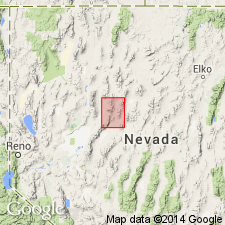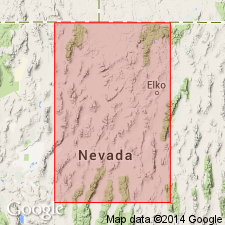
- Usage in publication:
-
- Havallah formation*
- Modifications:
-
- Original reference
- Dominant lithology:
-
- Chert
- Quartzite
- Limestone
- AAPG geologic province:
-
- Great Basin province
Summary:
Also 1952, Geology of the Golconda quadrangle, Nevada: USGS Geol. Quad. Map [GQ-15]. Havallah formation. Intertonguing chert, slate, and quartzite with some limestone lenses and quartzose grit; rare greenstone near base. Quartzite, light-brown, very fine- and even-grained; locally cross-bedded and conglomeratic near base. Limestone grades into calcareous slate or into coarse sandstone with calcareous matrix. Chert is evenly bedded, mostly light colored. Incomplete section at type locality exceeds 10,000 feet. Underlies Kiopato formation with major angular unconformity and overlies Pumpernickel formation (new) with contact gradational. Age is Permian(?) (Wolfcamp and possibly Leonard).
Type locality: on ridge south of Hoffman Canyon in Tobin Range, Golconda quadrangle, north-central NV. Named from Havallah Range which is Indian name for Tobin Range (40th Parallel Atlas).
Source: US geologic names lexicon (USGS Bull. 1200, p. 1704).

- Usage in publication:
-
- Havallah formation*
- Modifications:
-
- Age modified
- AAPG geologic province:
-
- Great Basin province
Summary:
Pg. 2824 (fig. 5), 2847-2848. Age is Pennsylvanian and Permian.
Source: US geologic names lexicon (USGS Bull. 1200, p. 1704).
For more information, please contact Nancy Stamm, Geologic Names Committee Secretary.
Asterisk (*) indicates published by U.S. Geological Survey authors.
"No current usage" (†) implies that a name has been abandoned or has fallen into disuse. Former usage and, if known, replacement name given in parentheses ( ).
Slash (/) indicates name conflicts with nomenclatural guidelines (CSN, 1933; ACSN, 1961, 1970; NACSN, 1983, 2005, 2021). May be explained within brackets ([ ]).

